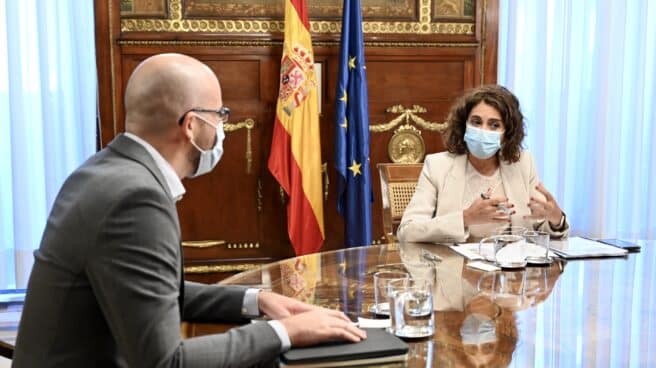

Finance Minister Maria Jesus Montero (PSOE) and Secretary of State for Social Rights Nacho Alvarez (Unidas Podemos) pictured in 2020.
The two parties in government, PSOE and United We Can, finally agreed this morning on a common state budget for 2023. The pact, which they will approve on Tuesday in the Council of Ministers and which will later be submitted to the Congress of Deputies. where they hope to do so with regular partners before the end of the year.
These are the third budgets to be closed by a coalition government, and probably the last legislature budget in which the two factions managed to overcome their differences to pass new bills. Since they have not yet been approved, the famous Yellow Book, which usually contains all the measures, has not been published, but these are, in the first approximation, the key points that will be included in the bill and which facilitate agreement.
Assistance of 100 euros for young children
The PSOE has succumbed to Podemos’ demands when it comes to an agreement on a universal parenting income of 100 euros per month, which will become part of family law. It will be for families with children from zero to three years old, similar to what has existed so far, but will no longer be limited to working mothers, but rather will be generalized.
To control who benefits from this, some income cap could be included that has not yet been reported. Also included are new approval permissions for guardians. Families with a single mother and two children are considered large families.
Unemployment benefit extension
Labor and Social Economy Minister Yolanda Diaz announced that with these budgets, unemployment benefits will again be 60% of the regulatory base from the seventh month. Rajoy limited it to 50% in 2012.
The change will benefit about 300,000 people and cost the state about 100 euros per unemployed person, Secretary of State for Employment Joaquín Pérez Rey said Tuesday at a press conference on unemployment data. “These are some PGEs who are talking to the working people, the ones who are having the hardest time,” Diaz suggested.
Increases minimum living income and IPREM
The State Multiple Effects Income Index (IPREM), which is used to calculate various allowances and allowances, is increased from €579.02 to €600. Based on this figure, social assistance, unemployment benefits, scholarships and minimum living income (IMV) are indicated. This change, however, does not offset the sharp rise in inflation this year.
600 million for addiction shock plan
Included, Yolanda Diaz said, is a €600 million dependency relief plan that aims to reduce waiting lists by introducing new benefits and services and “improving working conditions for those who care.”
Similarly, the national health system is being strengthened, “especially in three areas: primary health care, mental health (budget increase of 67%) and oral health”, as well as elements allocated to the equity policy, in particular the plan for the placement of victims of trafficking people and a joint program.
Tax package with reduced personal income tax and income tax
As this media outlet explained last week, the two sides agreed last week to cut personal income tax for the lowest earners, along with increases for the richest, help for the self-employed, and corporate tax changes. With the fiscal package, the executive expects to raise another $3,144 million over the next two years (2023–2024).
In addition, a tax on large fortunes in excess of three million has been agreed, but this new tax, which will mean the harmonization of the wealth tax, will not be handled within budgets, but as a parliamentary initiative.
Source: El Independiente